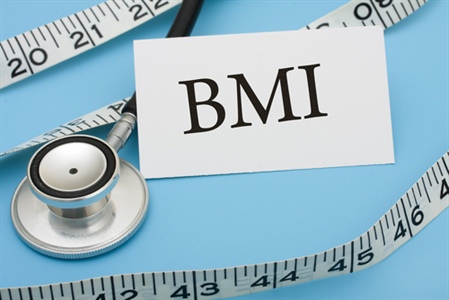What is a BMI? Knowing the Data Could Save Your Life
What is a BMI? Knowing the Data Could Save Your Life

These three letters are synonymous with losing weight, but what is a BMI, and what exactly does it tell you?
Losing weight is scary enough without the extra stress of analyzing data. When it comes to a BMI, though, don't fret about it: the results of this test can help you achieve your lifetime goals, and can even help save your life.
BMI stands for body mass index, and is calculated from a person’s weight and height. Although a BMI does not measure body fat directly, it can be considered an alternative for direct measures of body fat.
When people ask, “what is a BMI?” they aren’t quite sure what to expect. The reasons behind the importance of a BMI go way beyond cosmetics—it can actually tell the tale of a body that is going into risk overload.
What Risks Can a BMI Determine?
Rather than just telling you that you need to get healthy, a BMI can help you realize just how much you don’t want certain diseases.
Christy Shatlock is a registered dietitian, and one of the lead dietitians for BistroMD. As an expert on nutrition, Christy knows how important a BMI can be—especially when it comes to living a longer life and promoting better health.
“Let’s say, I’m 240 pounds, which means I need to be about 140-150 for my height for optimal health,” says Christy. “Every day, I’m probably tired, sluggish, lacking energy, but that’s all I’m thinking about. I don’t think about the fact I am more likely to get cancer. I don’t think about the fact that I can get diabetes and may have to take insulin every day. I don’t think about getting heart disease and clogged arteries. The only thing I’m thinking about is that I know I don’t like my body, and I know it’s hard for me to control what I eat.”
When it comes to the importance of a BMI, look at it like a doctor’s appointment. While in the office, your doctor is constantly prodding you and analyzing your health risks. Your doctor may also emphasize that your current physical condition is putting you at great risk for conditions like diabetes and heart disease.
"Of course we don't want these diseases,” says Christy. “But when people don’t take the opportunity to lose weight, it’s almost like they disregard their risk.”
Essentially, a BMI is a scale used by physicians to determine exactly what your risk is for developing certain conditions.
“If you are five pounds overweight, it’s a lot different than being 30 pounds overweight,” says Christy. “This is also much different from being 100 pounds overweight. The difference is how likely you are to get these diseases."
Basically, a person with more weight is more at risk, which is another way of saying that a person with a higher BMI is more at risk for certain diseases and conditions.
What Do the Numbers Tell Me?
Typically, a BMI will tell you one of four things: if you are underweight, at a healthy weight, if you are overweight, or if you are obese.
This reading takes your height and weight and produces a score for the category in which you fall under, based on these factors. Another consideration for a BMI score usually includes age.
“BMI essentially gives you a number that reveals your body fatness," says Christy. “The scores range between less than 18.5, up to 30 plus.”
A score that falls within the 25-30 range means that you are either overweight or obese. This puts you at a greater risk of developing certain, sometimes fatal conditions, like heart disease and different types of cancer.
“If you take a BMI and fall within this range, it’s important that you take action immediately, especially if your score is over 30,” says Christy. “I have personally worked with bistroMD’s founding physician, Caroline J. Cederquist, M.D., to develop the BMI test on the bistroMD website. The test is very conclusive, and will point out your specific risks, based on this information.”
So, what's the best thing you can do for your body if your BMI falls outside of a healthy range?
“Start eating a healthy diet,” says Christy. “People don’t realize that eating the right balance of foods on a daily basis can actually help save your life.”
This healthy balance of nutritionally proportioned meals can be delivered right to your door, courtesy of the experts at bistroMD.
“As one of the top weight loss physicians in the nation, Dr. Cederquist knows exactly what you need to feed your body in order to lose weight. This is exactly why she created convenient delivery of healthy and delicious meals from bistroMD,” says Christy. “Each meal contains the right balance of nutrition to retrain your metabolism to help you lose weight. You will lose weight, but in a healthy and effective way. With a proper diet from bistroMD, you may also be adding extra years to your life.”
-
The Diet Solution Program Scam Explained
Is the weight loss plan answer program pretty much as good as it cl
-
Healthy diet: Is glycemic index the key?
You can get some of the same benefits of a low-glycemic-index diet by
-
Different Methods How To Lose Weight Fast
Due to the innumerable programs for weight loss, losing weight fast is
-
Weapons In The Battle Against Male Love Handles: When To Use Liposuction And When To Consider Abdominoplasty
Liposuction (or lipo) for men has become increasingly popular as men s
-
Tips To Arm You In The War Against Weight Loss
It can take some time to lose weight, but with the right level o
-
How to Calculate Body Fat Percentage
When starting a new training routine of any kind, whether it be aiming
- DON'T MISS
- Choose To Lose The Simplicity Of Weight Loss And Understanding Emotional Eating
- Celebrity Diet Secrets And Their Secret Weight Loss Products
- Are You Jolting Up Your Weight Loss Program
- How To Get That Six Pack Abs Look: Total Body Workouts
- Weight loss pills side effects
- Best 3 Ways to Lose Belly Fat
- Eat Less and Exercise More: Is this the Wrong Advice for Losing Weight?
- I Lost 140 Pounds & Found I Didnt Want To Be Skinny; I Wanted To Be Fit
- Oprah Show Series: Have You Let Yourself Go?
- Hormone Gum May Cause Weight Loss




